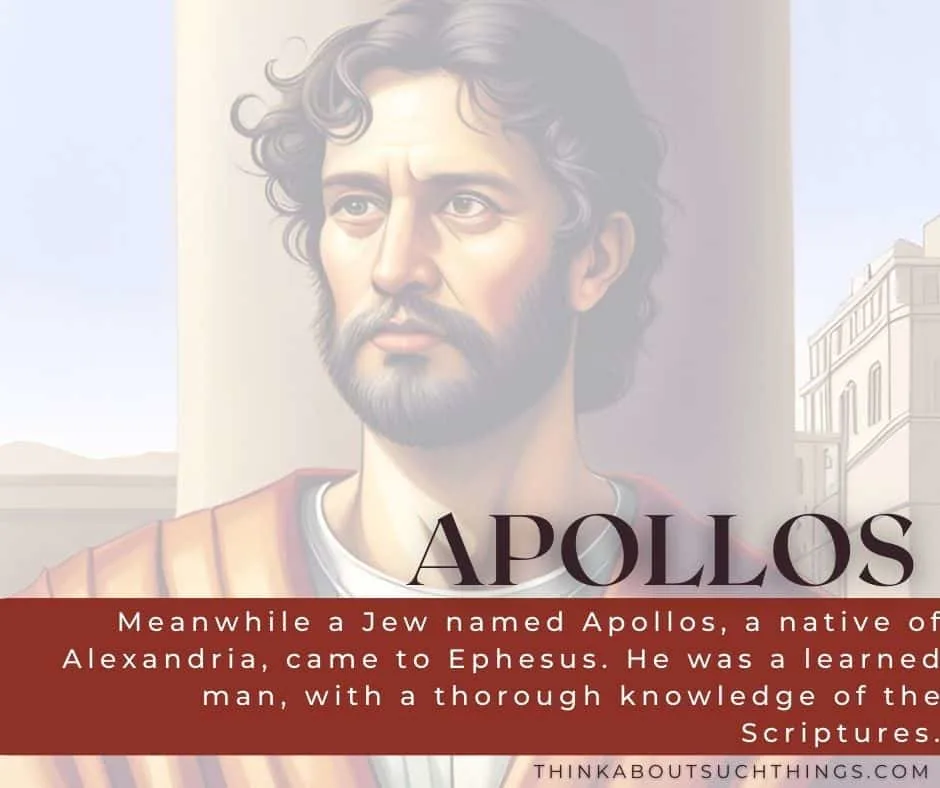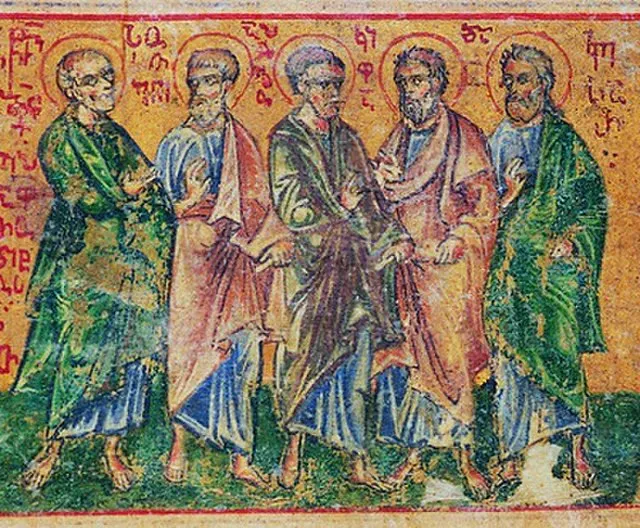In this article, we will learn about Apollos in the Bible, who he was, and what he did according to the book of Acts. So, grab your Bible, and let’s dive in…
Reading the New Testament, you will come across many names of people who played an essential role in what we know as the Christian faith today. Many well-known and familiar names exist, like Peter, John, and Paul.
However, one should never underestimate the impact of lesser-known people like Apollos on the modern church.
But who was Apollos?
Apollos was a Jewish Christian from Alexandra in Egypt. He had an excellent knowledge of scripture and was an energetic and passionate preacher of the gospel, able to debate Christ with Jews. The Bible also mentions that he was a big help to believers in the early church.
Paul once compared Apollos’s influence in the early church to his and the apostle Peter’s impact.
But the first time we read about Apollos in the Bible, in Acts 18:24-16, he did not know of Jesus’ resurrection and the baptism of the Holy Spirit, and Priscilla and Aquila had to teach him the whole truth of the gospel.

Apollos In The Bible
The name Apollos appears ten times in the New Testament. The first mention of Apollos in the Bible is in Acts 18:24.
Now a certain Jew named Apollos, born at Alexandria, an eloquent man and mighty in the Scriptures, came to Ephesus. – Acts 18:24
The writer identifies Apollos as a Jew from Alexandria, a city in Egypt, who came to Ephesus and preached in the synagogue. He was well educated and knew scripture very well. He was a good speaker who displayed great zeal for the gospel and preached boldly.
Verse 25 indicates that, although he accurately preached about Jesus, he only knew the baptism of John the Baptist.

For this reason, when two of Paul’s colleagues and friends, Aquila and his wife Priscilla, heard him speak in the synagogue, “they invited him to their home and explained to him the way of God more adequately.” (Acts 18:26).
In the same passage in Acts 18, we read that Apollos eventually wanted to travel to Acahia, and the fellow believers in Ephesus encouraged him.
The church in Ephesus even sent Apollos to Achaia with a letter of recommendation to introduce him to the believers there, and “he was a great help to those who by grace had believed.” (Acts 18:27).
Apollos had quite a following. Paul wrote about this in his first epistle to the church in Corinth:
Now I say this, that each of you says, “I am of Paul,” or “I am of Apollos,” or “I am of Cephas,” or “I am of Christ.” – 1 Corinthians 1:12
In this scripture, it appears that Paul equates Apollos’ following with his and Peter’s.
Paul wrote this epistle to the Corinthian church, not because he had a problem with some of the following Apollos or Peter (Cephas), but rather with the fact that members of the church considered the preacher more important than Christ himself.
This caused a division in the church, which is what Paul warned them against. He kept pleading with them for unity.
Now I plead with you, brethren, by the name of our Lord Jesus Christ, that you all speak the same thing, and that there be no divisions among you, but that you be perfectly joined together in the same mind and in the same judgment. – 1 Corinthians 1:10

A few factors could have contributed to the division in the church at Ephesus.
- Different Preaching Styles – Due to their different backgrounds and personalities, Paul, Peter, and Apollos had different preaching styles, which appealed to different people.
However, as they seemed to follow the preacher rather than the God they preached, this caused a division in the church. - Paul Left Corinth – Paul planted the church in Corinth during his second missionary journey but continued spreading the gospel to other cities and regions.
It appears, though, that Apollos stayed in Corinth, giving some believers a greater sense of loyalty toward Apollos.
What Does The Name Apollos Mean?
Many scholars believe that Apollos’ name in the Bible means “destroyer.” This is in relation to Greek mythology and the god Apollo.
Despite his name, Apollos was instrumental in building the early church!
You can say that his name might have referred to his ability to refute or “destroy” his opponents in debate. Or what I even like better is that he destroyed the work of the devil!
“For he vigorously refuted his Jewish opponents in public debate, proving from the Scriptures that Jesus was the Messiah.” -Acts 18:28
The Greek name Apollos could have two other meanings. Some say that it means “from Apollo,” while other references indicate that it refers to “manly beauty.” Both meanings could also be visible in Apollos’ life.
- From Apollo – Apollo means “god of the gate” or “protector.” As a Christian preacher, God, the Protector of His people, sent Apollos to do the work he was doing.
- Manly beauty – Although the Bible never describes Apollos’ physical appearance, Acts refers to him as a fiery preacher with a large Christian following (1 Corinthians 1:12). People enjoyed watching and listening to him preach.
Even though Apollo’s name stems from pagan roots, it doesn’t matter. When we are redeemed by the blood of the Lamb, we are a new creation!
Apollos And Paul
Although Apollos is mentioned once in the book of Acts, the apostle Paul mentions him several times in his epistles.
In 1 Corinthians, Paul refers to Apollos as an influential man with a substantial following, which led to division in the church, as some were followers of Paul, some of Apollos, and some of Peter.
But the relationship between Paul and Apollos goes much deeper than that.
During Paul’s second missionary journey, he met a couple in Corinth, Aquila and his wife, Priscilla, who became close friends and later became fellow workers in the faith.
Paul planted a church in Corinth at that time, then moved on to Ephesus with Aquila and Priscilla to plant a church there. In Ephesus, these two close friends of Paul met and taught Apollos and sent him with references to Corinth.
Paul describes Apollos as a valuable co-worker in 1 Corinthians 3, still addressing the apparent division in the Corinthian church.
What, after all, is Apollos? And what is Paul? Only servants, through whom you came to believe – as the Lord has assigned to each task. I planted the seed, Apollos watered it, but God has been making it grow. – 1 Corinthians 3:5-6
We also notice the co-worker relationship between Paul and Apollos in 1 Corinthians 4, where Paul considers himself and Apollos as examples to the Christians in Corinth.
Now, brothers and sisters, I have applied these things to myself and Apollos for your benefit, so that you may learn from us the meaning of the saying, ‘Do not go beyond what is written.’ – 1 Corinthians 4:6
Later in the same epistle, Paul refers to Apollos as a brother just before sending his final greetings to the church.
Now about our brother Apollos: I strongly urged him to go to you with the brothers. He was quite unwilling to go now, but he will go when he has the opportunity. – 1 Corinthians 46:12
Paul considered Apollos one of the brothers in Christ, working together in unity.
Finally, in the letter Paul writes to Titus, he also mentions Apollos:
Do everything you can to help Zenas the lawyer and Apollos on their way and see that they have everything they need. – Titus 3:13
From this and the previous scripture, it appears that Apollos spent some time with Paul. It seems that Paul sent Zenas and Apollos to Titus with the letter.
One can come to the conclusion that Paul considered Apollos a valuable co-worker and a servant of Christ, an influential leader in the early church, and a brother in the faith. What a beautiful relationship!
It also appears that Apollos spent some time with Paul, assisting him in his missionary work.
To recap…
Apollos was a Jewish Christian from Alexandria in Egypt. He was a learned man with excellent knowledge of the Scriptures and could destroy the arguments of the Jews in a debate!
He learned about Christ’s resurrection and the Holy Spirit from Priscilla and Aquila, and later, Paul considered him a brother, co-worker, and influential leader in the early church.
So, even though Apollos didn’t write letters like Paul, he still had a huge influence on church history and the expanse of God’s Kingdom!

Melissa is a passionate minister, speaker and an ongoing learner of the Bible. She has been involved in church and vocational ministry for over 18 years. And is the founder of Think About Such Things. She has the heart to equip the saints by helping them get into the Word of God and fall more in love with Jesus. She also enjoys family, cooking, and reading.
She has spoken in churches in California, Oregon, Texas, and Mexico and has been featured in Guidepost Magazine and All Recipes Magazine. Read More…
